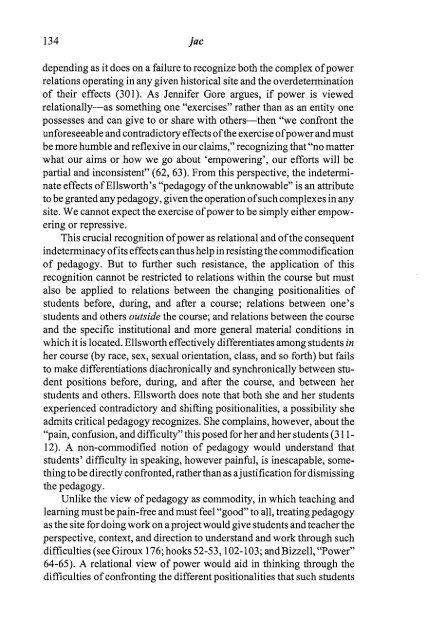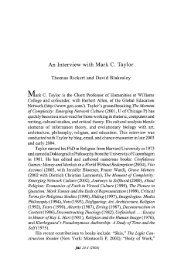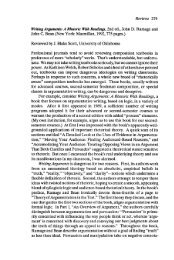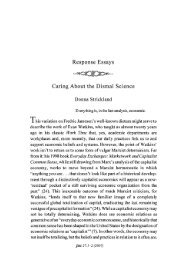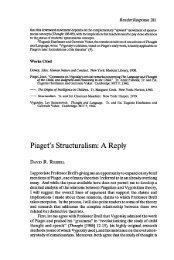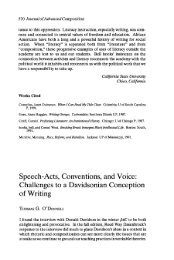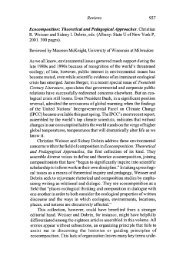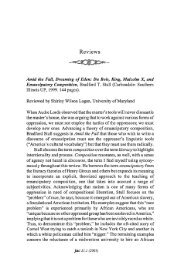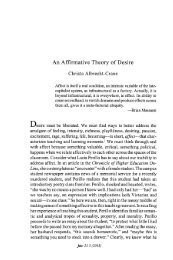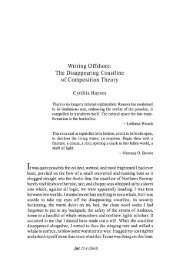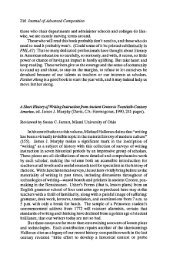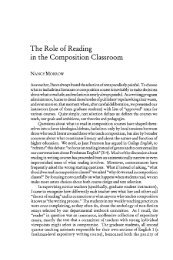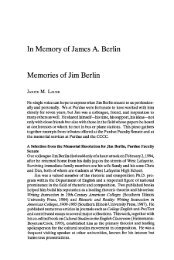Politics, Pedagogy, and the Profession of Composition ... - JAC Online
Politics, Pedagogy, and the Profession of Composition ... - JAC Online
Politics, Pedagogy, and the Profession of Composition ... - JAC Online
Create successful ePaper yourself
Turn your PDF publications into a flip-book with our unique Google optimized e-Paper software.
134 jac<br />
depending as it does on a failure to recognize both <strong>the</strong> complex <strong>of</strong> power<br />
relations operating in any given historical site <strong>and</strong> <strong>the</strong> overdetermination<br />
<strong>of</strong> <strong>the</strong>ir effects (301). As Jennifer Gore argues, if power is viewed<br />
relationally-as something one "exercises" ra<strong>the</strong>r than as an entity one<br />
possesses <strong>and</strong> can give to or share with o<strong>the</strong>rs-<strong>the</strong>n ''we confront <strong>the</strong><br />
unforeseeable <strong>and</strong> contradictory effects <strong>of</strong> <strong>the</strong> exercise <strong>of</strong> power <strong>and</strong> must<br />
be more humble <strong>and</strong> reflexive in our claims," recognizing that "no matter<br />
what our aims or how we go about 'empowering', our efforts will be<br />
partial <strong>and</strong> inconsistent" (62, 63). From this perspective, <strong>the</strong> indeterminate<br />
effects <strong>of</strong> Ellsworth's "pedagogy <strong>of</strong> <strong>the</strong> unknowable" is an attribute<br />
to be granted any pedagogy, given <strong>the</strong> operation <strong>of</strong> such complexes in any<br />
site. We cannot expect <strong>the</strong> exercise <strong>of</strong> power to be simply ei<strong>the</strong>r empowering<br />
or repressive.<br />
This crucial recognition <strong>of</strong> power as relational <strong>and</strong> <strong>of</strong> <strong>the</strong> consequent<br />
indeterminacy <strong>of</strong>its effects can thus help in resisting <strong>the</strong> commodification<br />
<strong>of</strong> pedagogy. But to fur<strong>the</strong>r such resistance, <strong>the</strong> application <strong>of</strong> this<br />
recognition cannot be restricted to relations within <strong>the</strong> course but must<br />
also be applied to relations between <strong>the</strong> changing positionalities <strong>of</strong><br />
students before, during, <strong>and</strong> after a course; relations between one's<br />
students <strong>and</strong> o<strong>the</strong>rs outside <strong>the</strong> course; <strong>and</strong> relations between <strong>the</strong> course<br />
<strong>and</strong> <strong>the</strong> specific institutional <strong>and</strong> more general material conditions in<br />
which it is located. Ellsworth effectively differentiates among students in<br />
her course (by race, sex, sexual orientation, class, <strong>and</strong> so forth) but fails<br />
to make differentiations diachronically <strong>and</strong> synchronically between student<br />
positions before, during, <strong>and</strong> after <strong>the</strong> course, <strong>and</strong> between her<br />
students <strong>and</strong> o<strong>the</strong>rs. Ellsworth does note that both she <strong>and</strong> her students<br />
experienced contradictory <strong>and</strong> shifting positionalities, a possibility she<br />
admits critical pedagogy recognizes. She complains, however, about <strong>the</strong><br />
"pain, confusion, <strong>and</strong> difficulty" this posed for her <strong>and</strong> her students (311-<br />
12). A non-commodified notion <strong>of</strong> pedagogy would underst<strong>and</strong> that<br />
students' difficulty in speaking, however painful, is inescapable, something<br />
to be directly confronted, ra<strong>the</strong>r than as ajustification for dismissing<br />
<strong>the</strong> pedagogy.<br />
Unlike <strong>the</strong> view <strong>of</strong> pedagogy as commodity, in which teaching <strong>and</strong><br />
learning must be pain-free <strong>and</strong> must feel "good" to all, treating pedagogy<br />
as <strong>the</strong> site for doing work on a project would give students <strong>and</strong> teacher <strong>the</strong><br />
perspective, context, <strong>and</strong> direction to underst<strong>and</strong> <strong>and</strong> work through such<br />
difficulties (see Giroux 176; hooks 52-53, 102-103; <strong>and</strong> Bizzell, "Power"<br />
64-65). A relational view <strong>of</strong> power would aid in thinking through <strong>the</strong><br />
difficulties <strong>of</strong> confronting <strong>the</strong> different positionalities that such students


